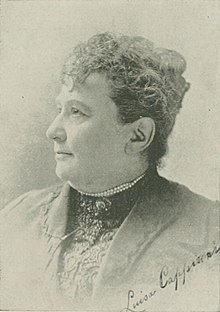Luisa Kapp-Young | |
|---|---|
 | |
| Born | Luisa Young 24 April 1829 Linz, Austria |
| Died | September 27, 1919 (aged 90) Zürich, Switzerland |
| Pen name | Luisa Cappiani |
| Occupation | dramatic operatic soprano, musical educator, essayist |
| Alma mater | Vienna Conservatory |
| Genre | opera |
| Notable works | Practical Hints and Helps for Perfection in Singing[1] |
| Spouse | Gisbert Kapp |
| Children | Gisbert Kapp |
Luisa Kapp-Young (née, Young; pseudonym, Luisa Cappiani; 24 April 1829 – 27 September 1919), was an Austrian dramatic operatic soprano, musical educator, and essayist who used the principle of the Aeolian harp emission of tone, which excluded all effort in the throat, and preserved the voice.[2] Kapp-Young made her debut after the death of her husband, Gisbert Kapp, in 1859. In 1861, she sang Wagner roles in Rotterdam. In the United States, she appeared in 1867 as Mme. Kapp-Young. After several seasons in Italy, she came back to the United States, and established herself under the name of Cappiani as a teacher in Boston and New York City. In 1884, she was one of the original founders of the American Federation of Musicians, and the only woman initially elected. After 1899, she lived permanently in Milan, and died in Zürich in 1919. Her essays on the voice were reproduced in many musical papers in the U.S. and other countries. She died in 1919.
- ^ Cappiani 1908, p. 1.
- ^ W. B. Conkey Company 1894, p. 500.